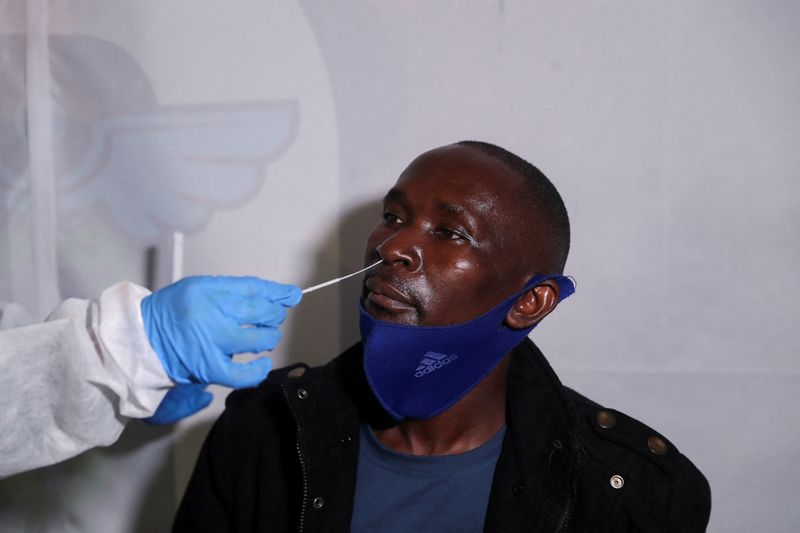By Nancy Lapid
(Reuters) - The following is a summary of some recent studies on COVID-19. They include research that warrants further study to corroborate the findings and that has yet to be certified by peer review.
Some long COVID patients still have virus in blood
Some cases of long COVID may be the immune system's response to a SARS-CoV-2 infection lurking somewhere in the body, new findings from a small study suggest.
Researchers analyzed multiple plasma samples collected over time from 63 patients with COVID-19, including 37 who went on to develop long COVID. In the majority of those with long COVID, the spike protein from the surface of the virus was detectable for up to 12 months, whereas it was not present in plasma samples from recovered patients without lasting symptoms. Spike protein circulating in the blood could mean "a reservoir of active virus persists in the body," the researchers said in a paper posted on medRxiv https://www.medrxiv.org/content/10.1101/2022.06.14.22276401v1 last week ahead of peer review. Exactly where that reservoir might be is not clear from this study. Researchers said they have previously found active virus in the gastrointestinal tract of children weeks after the initial coronavirus infection, and other researchers have found genetic evidence of the virus "in multiple anatomic sites up to seven months after symptom onset."
If the results can be confirmed in larger studies, the presence of spike protein in the blood long after the initial infection may be one way to diagnose long COVID, the researchers said.
Paxlovid "rebound" patients may need longer treatment
The rebound of symptoms reported in some COVID-19 patients who took a five-day course of Pfizer (NYSE:PFE)'s antiviral Paxlovid pills may be the result of insufficient treatment, according to researchers who closely evaluated one such patient.
Trial results showed that Paxlovid can reduce the risk of hospitalization and death from COVID-19 in high-risk patients by 89% if taken within five days of symptom onset. In some patients, however, virus levels and symptoms have rebounded after completing a course of Paxlovid, leading to concerns that variants might be developing resistance to the two-drug treatment or that the pills may somehow be weakening patients' antibody resistance. But when researchers isolated the Omicron BA.2 variant from a rebound patient and tested it in lab experiments, they found it was still sensitive to Paxlovid and had no mutations that would reduce the drug's effectiveness. They also found their patient's antibodies could still block the virus from entering and infecting new cells.
The rebound of COVID-19 symptoms after Paxlovid treatment is likely happening because not enough of the drug is reaching infected cells to completely stop the virus from making copies of itself, the researchers said in a paper published on Monday in Clinical Infectious Diseases https://academic.oup.com/cid/advance-article/doi/10.1093/cid/ciac496/6611663. It is also possible that the drug may be metabolized, or processed, at different rates in different people, or that some people need to take it for more than five days.
After COVID-19, kids have more symptoms but less anxiety
Persistent health problems were only slightly more common in children after COVID-19 than in similarly-aged kids who avoided the virus, researchers from Denmark reported on Wednesday in The Lancet Child & Adolescent Health https://www.thelancet.com/journals/lanchi/article/PIIS2352-4642(22)00154-7/fulltext. Anxiety levels, however, were higher in children who never had COVID-19, the researchers also found.
They said 40% of infants and toddlers with COVID-19 and 27% of their uninfected peers experienced at least one symptom for more than two months. Among kids ages 4 to 11, persistent symptoms were seen in 38% with COVID-19 and 34% without it. And among 12- to 14-year-olds, 46% of those with COVID-19 and 41% of those without it had long-lasting symptoms. The results were based on a survey of nearly 11,000 mothers of infected children and nearly 33,000 mothers of uninfected kids.
While symptoms associated with long COVID such as headache, mood swings, abdominal pain and fatigue are often experienced by otherwise healthy children, infected children had longer-lasting symptoms and one-third had new symptoms that developed after COVID-19. To the researchers' surprise, children who had COVID-19 experienced fewer psychological and social problems than those in the control group. They speculated this may be because the uninfected children had more "fear of the unknown disease and more restricted everyday life due to protecting themselves from catching the virus."
Click for a Reuters graphic https://tmsnrt.rs/3c7R3Bl on vaccines in development.
